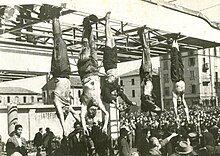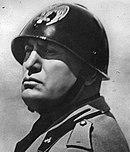Clara Petacci
Clara Petacci | |
|---|---|
 Petacci in the 1930s | |
| Born | 28 February 1912 |
| Died | 28 April 1945 (aged 33) |
| Cause of death | Execution by firing squad |
| Known for | Mistress of Benito Mussolini |
| Height | 1.60 m (5 ft 3 in) |
| Spouse |
Riccardo Federici
(m. 1934; div. 1936) |
| Partner | Benito Mussolini (1933–1945) |
| Relatives | Miriam di San Servolo (sister) Marcello Petacci (brother) |
Clara "Claretta" Petacci (Italian: [klaˈretta peˈtattʃi]; 28 February 1912 – 28 April 1945) was a mistress of the Italian dictator Benito Mussolini. She was killed by Italian partisans during Mussolini's summary execution.
Early life
[edit]Daughter of Giuseppina Persichetti (1888–1962) and the physician Francesco Saverio Petacci (1883–1970), Clara Petacci was born into a privileged and religious family in Rome in 1912.[1][2] Her father, a physician of the Holy Apostolic Palaces,[3] became a supporter of fascism. A child when Mussolini rose to power in the 1920s, Clara Petacci idolised him from an early age. After Violet Gibson attempted to assassinate the dictator in April 1926, the 14-year-old Petacci wrote to him commenting "O, Duce, why was I not with you? ... Could I not have strangled that murderous woman?"[4]
Relationship with Mussolini
[edit]Petacci had a long-standing relationship with Mussolini while he was married to Rachele Mussolini. Petacci was 28 years younger than Mussolini.[5] They met for the first time in April 1932 when Mussolini, driving with an aide to Ostia, overtook a car occupied by the twenty-year-old Petacci and family members. She called out, "Duce! Duce!" and when he stopped, told him that she had been writing to him since her early teens.[6]
In 1934, Petacci married Italian Air Force officer Riccardo Federici, but she parted ways with her husband when he was sent to Tokyo as Air Attaché in 1936.[7] Petacci then became the mistress of the fifty-three-year-old Mussolini, visiting his headquarters in the Palazzo Venezia, where a small apartment was reserved for her. Her infatuation with Mussolini appears to have been genuine and permanent. The affair became widely known and members of the Petacci family, notably her brother, Marcello, were able to benefit financially and professionally by influence-selling.[8]
Part of Petacci and Mussolini's correspondence has not been released on the grounds of privacy.[9]
Death
[edit]
On 27 April 1945, Mussolini and Petacci were captured by partisans while traveling with a Luftwaffe convoy retreating to Germany. The German column included a number of Italian Social Republic members.[10]
On 28 April, she and Mussolini were taken to Mezzegra and executed. One source alleges Petacci's execution was not planned and that she died throwing herself on Mussolini in a vain attempt to protect him from the bullets.[11] On the following day, the bodies of Mussolini and Petacci were taken to Piazzale Loreto in Milan and hung upside down in front of a petrol station. The bodies were photographed as a crowd vented their rage upon them.[12] On the same day, Clara's brother, Marcello Petacci, was also killed in Dongo by the partisans, along with fifteen other people complicit in Mussolini's escape.
After the war, the family of Petacci began civil and criminal court cases against Walter Audisio for Petacci's unlawful killing. After a lengthy legal process, an investigating judge eventually closed the case in 1967. Audisio was acquitted of murder and embezzlement on the grounds that the actions complained of occurred as an act of war against the Germans and the fascists during a period of enemy occupation.[13]
See also
[edit]- Eva Braun – Adolf Hitler's mistress
- Margherita Sarfatti – one of Mussolini's earlier mistresses
- Grand Hotel Rimini – Petacci's residence in Rimini during Mussolini's summer holidays in Riccione[14][15]
References
[edit]- ^ Barber, Tony (17 February 2017). "Claretta by RJB Bosworth — Mussolini's last lover". www.ft.com. Archived from the original on 2017-02-18. Retrieved 2021-04-02.
- ^ Downing, Ben (2017-03-24). "In Bed With Il Duce". Wall Street Journal. ISSN 0099-9660. Retrieved 2021-04-02.
- ^ De Felice (1981) p. 278
- ^ Thomson, Ian (25 February 2017). "The Ben and Clara affair". www.spectator.co.uk. Archived from the original on 2020-08-25. Retrieved 2021-04-02.
- ^ (in Spanish) Giuseppina Persichetti, La enamorada de Mussolini, Madrid, Ediciones Caballero Audaz, 1947.
- ^ Gallo, Max (1974). Mussolini's Italy. Abelard-Schuman. p. 216. ISBN 0-200-72140-2.
- ^ Boswort, R.J.B. (2010). Mussolini. Bloomsbury.
- ^ Gallo, Max (1974). Mussolini's Italy. Abelard-Schuman. pp. 270–271. ISBN 0-200-72140-2.
- ^ (in Italian) Giampiero Buonomo, Quel carteggio tra Mussolini e la Petacci. Storici sacrificati sull’altare della privacy, in Diritto e giustizia, 16 luglio 2005.
- ^ Gunther Langes, Auf Wiedersehen Claretta. Il diario dell'uomo che poteva salvare Mussolini e la Petacci, a cura di Nico Pirozzi, Villaricca, Edizioni Cento Autori, 2012. ISBN 978-88-97121-37-4.
- ^ Pierluigi Baima Bollone, Le ultime ore di Mussolini, Milano, Mondadori, 2005, ISBN 88-04-53487-7., pagg. 89 e succ.ve
- ^ "Death of the Father-Mussolini & Fascist Italy: the 'infamous' exhibit". Cornell Institute for Digital Collections. 1999.
- ^ Baima Bollone, Pierluigi (2005). Le ultime ore di Mussolini. Mondadori (Italy). p. 123. ISBN 88-04-53487-7.
- ^ "Rachele Mussolini perde la causa non riavrà più i beni di un tempo" [Rachele Mussolini loses the case: She will not have again the goods of time ago]. La Stampa (in Italian). 13 May 1977. p. 22. Retrieved 7 February 2024.
- ^ Annovazzi Lodi, Stefano (3 December 2019). "Il grand hotel della riviera che faceva sognare Fellini" [The grand hotel on the riviera that made Fellini dream]. ELLE Decor (in Italian). Retrieved 3 February 2024.
Sources
[edit]- De Felice, Renzo (1996) [1981]. Mussolini. Il Duce. 2: Lo stato totalitario, 1936–1940 (in Italian) (2 ed.). Torino: Einaudi.
Further reading
[edit]- Bosworth, R.J.B. (2017). Claretta: Mussolini's Last Lover, Yale University Press ISBN 978-0300214277
- Farrell, Nicholas (2003). Mussolini: A New Life, Phoenix Press: London ISBN 1-84212-123-5
- Garibaldi, Luciano (2004). Mussolini: The Secrets of His Death, Enigma Books, New York ISBN 1-929631-23-5
- Moseley, Ray (2004). Mussolini: The Last 600 Days of Il Duce, Taylor Trade Publishing, Dallas ISBN 1-58979-095-2

